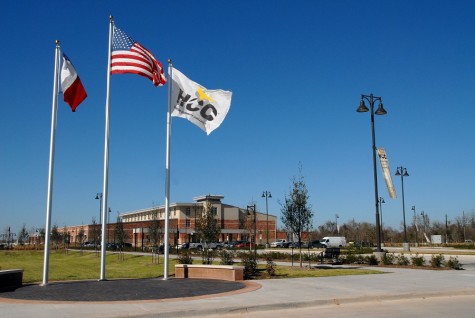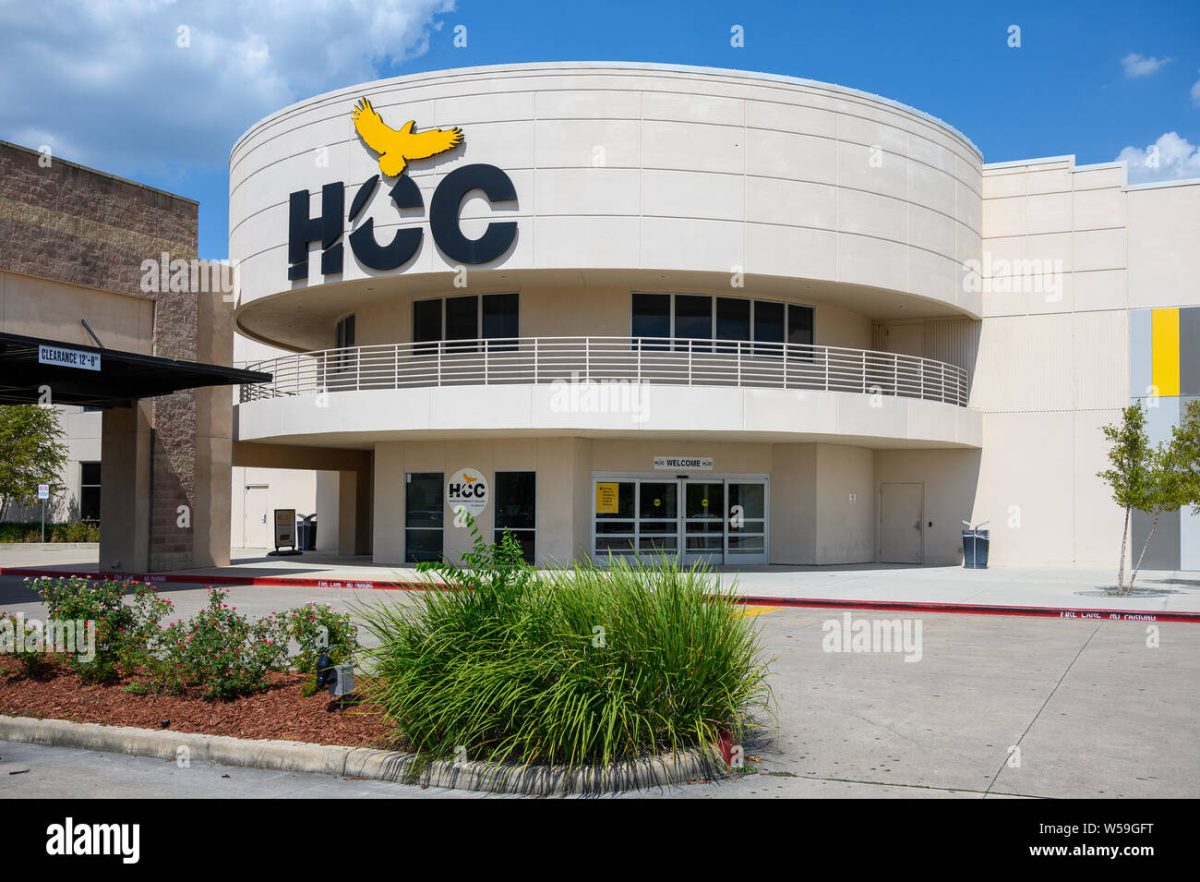Controversial MoCity campus relocates
A computer rendering of what the new Missouri City campus off Texas Parkway will look like when in opens in March 2017.
January 31, 2016
If you have ever walked through the sparsely populated halls of the Missouri City campus, you wouldn’t guess that this quiet campus is probably the most controversial Houston Community College location.
On Thursday, Jan. 21, the governing board of HCC voted to sell the remaining 33-acre tract of unimproved property around the campus back to the Johnson Development Corporation, which the college originally bought the land from in two purchases back in 2002 and 2004.
These acres in the master-planned community of Sienna Plantation were declared a property surplus by the Board of Trustees about a year ago. Thursday’s vote is another step in completing the relocation of the Missouri City campus to the new location adjacent to the Missouri City Hall building on Texas Parkway, where there is more sustained development by the city.

The current Missouri City HCC campus at the Sienna location.
This is the third time that the Missouri City campus has moved. Before the Sienna location was built, HCC had a location off Cartwright Road beginning in 1997. The new Texas Parkway location will be only two miles away from the Stafford campus, the Sienna location is six miles away.
“Two times we built campuses in Missouri City, and two times they didn’t make. And here, we’re doing a third one?” asked Trustee Dave Wilson at the board meeting. He has voted against the deal every step of the way.
A commitment was made to the citizens of Missouri City when they joined the HCC taxing district that they would be given their own campus. Having locations so close together is economically questionable at best, but the administration believes that moving to a more visible location off Texas Parkway will attract new students.
Back in December, the Board of Trustees gave their final approval to the sale of 11.75 acres and the current campus building to Fort Bent County. About 4.5 acres were previously given to the county for the development of the Sienna Plantation library.
The administration claims that relocation will come with no deficit to HCC’s budget, but that doesn’t mean HCC didn’t sink a few million in the Sienna Plantation campus.
HCC invested $18,770,520 in non-transferable assets in the Sienna location. (Transferable assets like furniture and equipment will be moved to the new location.) Subtract $2,667,818 of value in accumulated depreciation, and HCC is walking away from $16,102,702 of invested tax money.
The college sold the undeveloped 33 acres to the Johnson Corporation for $2,563,161. Newly elected Trustee John Hansen called the sell back a “yucky deal,” but HCC lawyers advised that under the college’s current deed, they have no chance of getting a better deal even if they take it to court.

When selling to another governmental entity, the college must abide by the appraised value. They’re selling the 11.75 acres and campus building to Fort Bend County, at the appraised value of $8,000,000.
From the two separate land and building sales, HCC is taking in $10,563,161 for the property. Recall that HCC invested $16,102,702 in non-transferable assets. That means at least $5,539,541 in tax money was lost on the Sienna location. HCC sold a $16 million investment for $10.5 million.
The way HCC is passing this off as a zero-dollar loss is that the deficit is filled by grant and tax dollars. Besides sinking $5,539,541 on the Sienna location, the college is appropriating $21,500,000 from the 2013 Capital Improvement Project bond approved by district voters.
Add those two numbers together and HCC is dropping $27,039,541 of taxpayer money to move the Missouri City campus.
Granted, the $21.5 million in tax money was approved by voters as part of the Capital Improvement project, which was a $425 million bond package for 12 projects across the city.
After the bond program passed, “there was going to be building happening in one place or another [in Missouri City],” said Trustee Zeph Capo, “there was nothing else that anybody on this board could do to turn that particular issue around.” He added that “I didn’t support putting another $21 million into the current Sienna Plantation area.”
The Texas Parkway location is flushed with $33,330,923 in funding when you add the bond money, the land and building sales and the $1,267,762 grant received from the non-governmental George Foundation.
In Jan. 2015, the board approved the $3,627,677 purchase of the 41 acre Texas Parkway site. Building construction is budgeted at $28,691,579 for the new 75 thousand square foot building, set to be completed in March 2017. Meanwhile, closing and other relocation costs add up to $868,596. If the new construction stays on target, HCC will have $143,071 in cash left over, but since any unused funds will be returned to the George Foundation, there will be no net cash gain for HCC from the move.
The administration did not publish these numbers until a day after the final vote. “We can’t get input from the community if we can’t give you the facts,” said Trustee Robert Glaser, who has been making calls for more transparency. “We’re making a decision on buying and selling a property without data,” added Trustee Dave Wilson.
Trustee Eva Loredo called the deal “a win” for HCC because the local community supports it. She admitted that “the dollar issue is there,” but even though she is one of the nine, elected trustees with final authority to make the decisions that govern HCC, she said that “it’s beyond our control.” Loredo was just re-elected to serve another six-year term. Who controls “the dollar issue” if not trustees?
Trustee Dave Wilson said that “Everyone at this table knew what this deal was, and they had a judiciary responsibility to look into that.”
Trustee Christopher Oliver said that this should serve “as a teaching moment as we move forward on any and all real estate deals as to how much homework we should do.” First elected to the board in 1995, Oliver is the longest-serving trustee on the board. He is the only current trustee who has sat through all three of the Missouri City campus moves.
Trustee Hansen was elected last November and had just taken his oath of office before this meeting, so he had no role in the making of this deal. After making a 10-minute public statement, which made it clear how much homework he did on this issue, he said “this ship has already sailed” and abstained from voting.
Read the numbers published Friday on the Missouri City campus move here.































